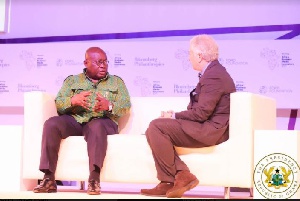The President of the Republic, Nana Addo Dankwa Akufo-Addo, has stated that African journalists have a duty to help change the image about Africa, and establish a narrative, which is more positive.
According to President Akufo-Addo, African media practitioners have faced many challenges, ranging from a highly polarised media environment, lack of technological support, limited investment in the sector, poorly paid journalists, threats to their lives, corruption, and lack of requisite training.
These challenges, he said, have led to the African media, largely, shirking its responsibility in telling the African story.
“As a result, the narrative has been shaped and told by foreign journalists through their own lenses and words. The projection of the continent, as a result, has often been about war, disease, poverty, and famine,” he said.
President Akufo-Addo made this known on Monday, 13th November, 2017, when he delivered a speech at the ongoing Bloomberg Africa Business Media Innovators Summit, held at the Kempinski Hotel, Accra.
The President noted that the externally generated story of Africa might be hard to take, but, so long as there is widespread poverty and inequality, that will be the image that is going to be portrayed.
“This means that you, our writers, our journalists from the continent, the writers of the African story, carry a great responsibility. When you write, what you write, must be about the limitless possibilities on the continent. What is written about Africa by African writers must have the ultimate reference status,” he said.
African writers, the President stressed, played remarkable roles in the liberation of the continent from imperialism, and, thereby, set the tone for the discourse about the identity of Africans.
“It is now for you, our business and financial journalists, to set the tone for the economic development and prosperity of Africa. When our young people do not see a future in their countries, and cross the Sahara desert on foot and drown in the Mediterranean Sea, in a desperate bid to reach the mirage of a better life in Europe, no amount of beautiful lyrics will change our image,” he bemoaned.
The President noted that when African economies grow and improve, and its youth get educated and are self-confident and full of hope, “the world finds its way to our doors, and the language and history of our countries become attractive to our own and foreign universities.”
“When African economies improve and there is increasing prosperity, we will find that more and more people will become interested to invest in our continent, resulting in thriving economies, and the creation of progressive and prosperous nations.”
President Akufo-Addo was confident that technological advancement and innovations will help change the face of Africa’s media, and present the continent with even more greater control to tell its own story.
“That is why the Bloomberg Media Initiative in Africa (BMI) is a great initiative to help build the capacity of Africa’s media. This programme, I am confident, will deepen the capacity of our media, and equip them with the relevant skill set to tell the African story – the story of potential triumph over adversity, economic successes over failures, and initiatives that will lead to the sustainable development of the continent,” he said.
Through their work, President Akufo-Addo urged financial and business journalists on the continent to bring to the attention of governments and decision-makers why the promotion of business-friendly environments is important.
“They need to understand that the way to building that environment is when government and regulatory policies enhance, rather than inhibit or frustrate, trade, commerce and investments. Promoting the rule of law by our governments assures and gives confidence to the investor community that their investments would be safe.
When we master the narrative, we can, then, effectively tell the story about the looting of Africa, and the huge amounts of illicit funds that flow from our continent, funds which, if we are able to control, would be available to finance the development of the continent,” he added.
President Akufo-Addo applauded the Ghanaian media for being active in tackling the social ills of the country and advocating for the investment that will contribute to the sustainable development of the country.
“This generation of African media practitioners has to be the generation that refuses to be either victim or pawn, and accepts to travel down the path of genuine popular empowerment, which represents the strongest guarantee of our independence and sovereignty.
Freedom of expression, encompassing media freedom, is a critical element of that journey, which we must guard jealously at all times,” he added.
General News of Monday, 13 November 2017
Source: Flagstaff House Communications Bureau
Help change image about Africa – Akufo-Addo to journalists
Business
















